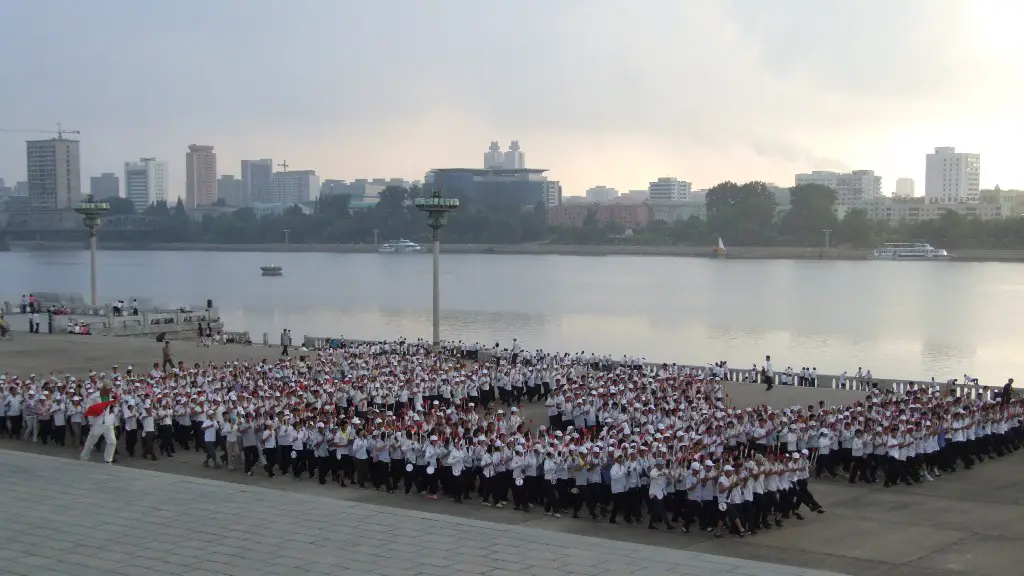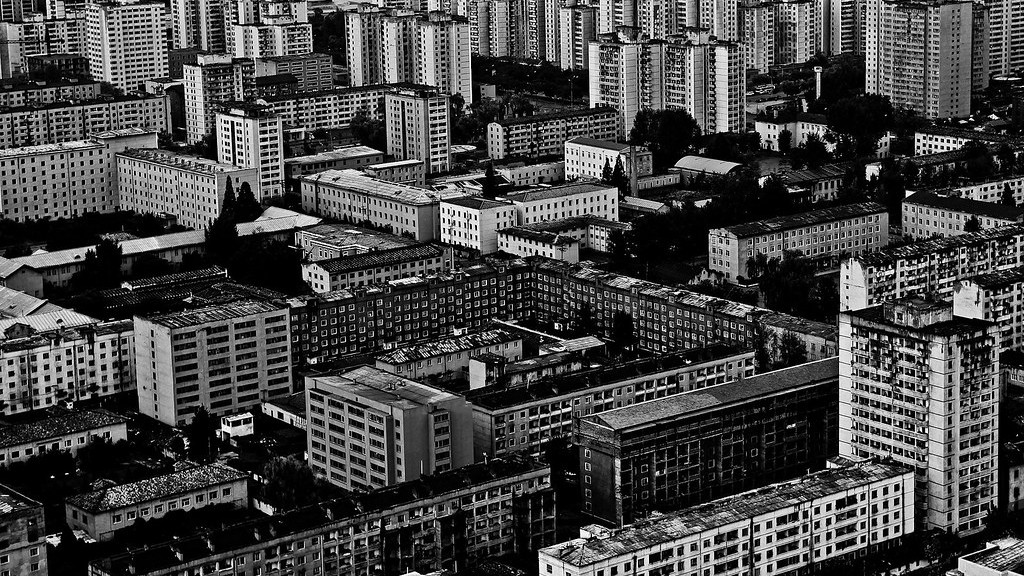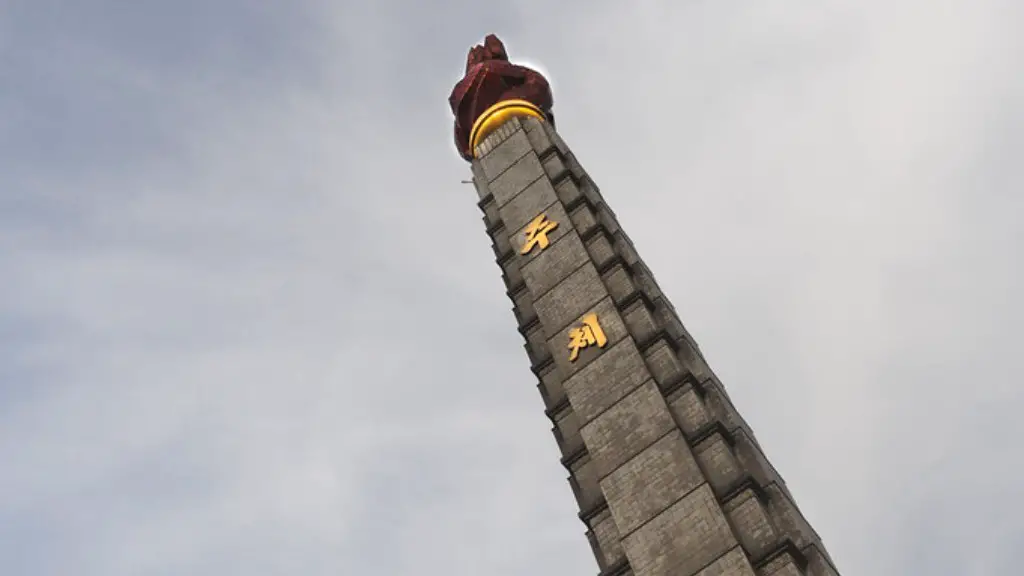Political System and Laws
North Korea is the world’s most isolated nation, and it is easy to understand why. The country operates under a totalitarian rule and most activities, both in and outside the country, are tightly controlled. Consequently, there are many things one cannot do in North Korea due to strict laws.
The political system in North Korea is a one-party dictatorship that is highly oppressive and avowedly hostile to individual expression. The laws are extremely restrictive and are ruthlessly enforced. Criticizing the leader and the political system of the country can lead to harsh punishments such as imprisonment, forced labor, or worse. The North Korean government also keeps a tight control over its citizens. It does not allow the freedom of expression and does not tolerate external opinions or criticism.
The government has heavily censored media and internet access and does not even allow media from outside the country. It also limits activities such as online gaming and social media. Any foreign media or communications are censored or blocked. Even in day-to-day life, there are many activities that citizens can not take part in, such as drinking alcohol or smoking in public places.
Travel Restrictions
Traveling to North Korea is a difficult experience and can be dangerous, as the possibility of getting arrested or detained is high. The citizens themselves are not allowed to leave the country and the borders are closely monitored by the North Korean military. Travelers need a special visa to enter the country, and even then, these visas are not granted lightly.
Foreigners who are allowed entry into North Korea are closely monitored and restricted in their activities. They are not allowed access to much of the country and many areas are off limits, such as military bases and power plants. Visitors are also heavily monitored while they are in the country, as the government attempts to prevent any “dangerous” information from leaving the country.
In addition, foreigners are not allowed to take photographs or videos of government buildings, military installations, or any other restricted areas. Generally speaking, visitors are encouraged to avoid engaging in religious discussion and to show no disrespect to the ruling party or its citizens.
Economic Inequality
The North Korean economy is heavily reliant on foreign aid, but the country still suffers from extreme economic inequality. The government has used this inequality to maintain control over its citizens, as those in power are able to benefit from the riches of the country while those in poverty suffer. Consequently, there is a ban on public demonstrations of any kind, and talking about economic issues is not allowed.
The government has also restricted the amount of money that individuals can have. This is in contrast to other socialist countries where citizens typically have access to basic goods and services, such as food and healthcare. In North Korea, this is often not the case and citizens are often left in poverty and without basic necessities.
The economic inequality also leads to a situation in which access to resources is highly restricted. The government often restricts access to basic goods such as food, clothing, and medicine, due to the shortage of money. This means that all citizens of the country are not able to access basic services and resources.
Freedoms of Speech and Religion
The government of North Korea has a very restrictive attitude towards freedom of speech and religion. The government does not tolerate any form of dissent and any kind of criticism is severely punished. Religious activities and education outside the state-sanctioned religion is prohibited.
Furthermore, citizens of North Korea are not allowed to access any form of media from outside the country, including books, music, films, and television. This means that the population is inculcated with state-sanctioned ideology and is not exposed to any divergent opinion that could challenge the existing order.
The government is also known to send propagandists abroad in order to spread its ideologies and discourage any kind of criticism from the international community. In addition, censorship of media within the country is very strict, and all media is heavily monitored.
Legal System and Punishment
The North Korean legal system is based on a series of laws that are enforced strictly. The punishment for offenses is often harsh, and includes long jail sentences and hard labor. There is no trial by jury and all decisions are made by the ruling party.
The government has also been known to take extreme measures, such as public executions and torture, as a way to punish those who dissent. In addition, citizens who are judged guilty of political crimes are often subjected to forced labor and imprisonment in labor camps.
The government also has the authority to imprison an entire family if one member is found guilty of any crime. This means that all members of the family, even the innocent ones, can be sent to labor camps and be subject to hard labor and torture.
Education System
The educational system in North Korea is highly restricted and only follows state-sanctioned texts and teachings. The curriculum is tightly controlled by the ruling party and is seen as a way to propagate its ideologies and to discourage any kind of critical thinking.
The North Korean government also operates a system of public schools, in which children are indoctrinated with state-sanctioned ideologies and encouraged to see the government as infallible. Teaching anything outside these officially sanctioned texts is strictly forbidden and can lead to punishment or even imprisonment.
Parents are also banned from teaching their children any kind of personal beliefs or values, as this is seen as a threat to the state-sanctioned ideologies. In addition, students are often monitored for any kind of anti-government sentiment, and if such sentiment is found, the student can be expelled or worse.
Religious Beliefs and Superstitions
For the most part, North Koreans are not allowed to practice any kind of religion. The state-sanctioned religion is a mix of Buddhism and Confucianism, but open worship of any other faith is prohibited by the government.
In addition, North Koreans are discouraged from engaging in any kind of superstitious activities. Some of the superstitions that are banned include fortune-telling, divination, astrology, and other activities that could be seen as opposed to the ruling party’s ideology.
At the same time, the North Korean government encourages its citizens to practice the state-sanctioned religion. This includes teaching the public about the official ideologies, promoting the ruling party and its policies, and discouraging criticism or dissent. This means that there is no freedom of religion in North Korea.
Cultural Norms and Sexuality
North Korea has very strict laws regarding cultural norms and sexuality. The government does not allow for any kind of sexual expression outside of the marriage and even within the marriage sexual expression is heavily censored.
Public displays of affection are not tolerated and any kind of behavior that could be seen as against the interests of the state, such as kissing in public, is strictly forbidden. In addition, the government has a tight control over what kind of music and television shows can be consumed by citizens.
Furthermore, the government strictly prevents access to any kind of foreign media, books, or films. This is done in order to ensure that foreign values, cultures, and ideologies do not become known to the public and to prevent them from challenging the ideologies of the ruling party.
Military Presence
North Korea is highly militarized and there is a strong military presence in the country. The military, which is loyal to the ruling party and operates on a tight budget, is in charge of all affairs in the country. It is deployed in many areas, including the borders, the urban centers, and the countryside, and it is in charge of the oppressive surveillance system.
The military also has the power to restrict travel both inside and outside the country. It is also responsible for assisting the government in monitoring the citizens and preventing any form of opposition. Consequently, freedom of movement around the country is heavily restricted.
Additionally, the military also has a strong presence in the cultural sphere, as it often sponsors events such as movies, plays, and gamings, as well as propagandistic music. This means that citizens of North Korea are not allowed to access any kind of media or cultural activities that are not in line with the ruling party’s ideologies.


